
Doberman: Your new pet
The Doberman is a brave, vigilant, energetic and determined dog. It is also affectionate and peaceful, although a bit suspicious of strangers.
In some places it is known as «Thuringer Pinscher», «Polizeilicher Soldatenhund» or «Doberman Pinscher», is a dog raised as a guardian, although it has also been used as a rescue, military, and police dog, due to its wonderful sense of smell and its elegant and intimidating presence.
It is suitable as a family pet and can interact with children, however, its owner must be careful, fair and firm. While it is a dog 100 percent loyal, due to its size and strength, when playing and dealing with people, they can hurt. Therefore, proper training from an early age is very important and also to always be very careful.
Today, the Doberman is considered dangerous in some societies. This is because, for a long time, it was used in films where some negative aspects of this breed were shown, such as aggressiveness, which came to instill fear in some people.
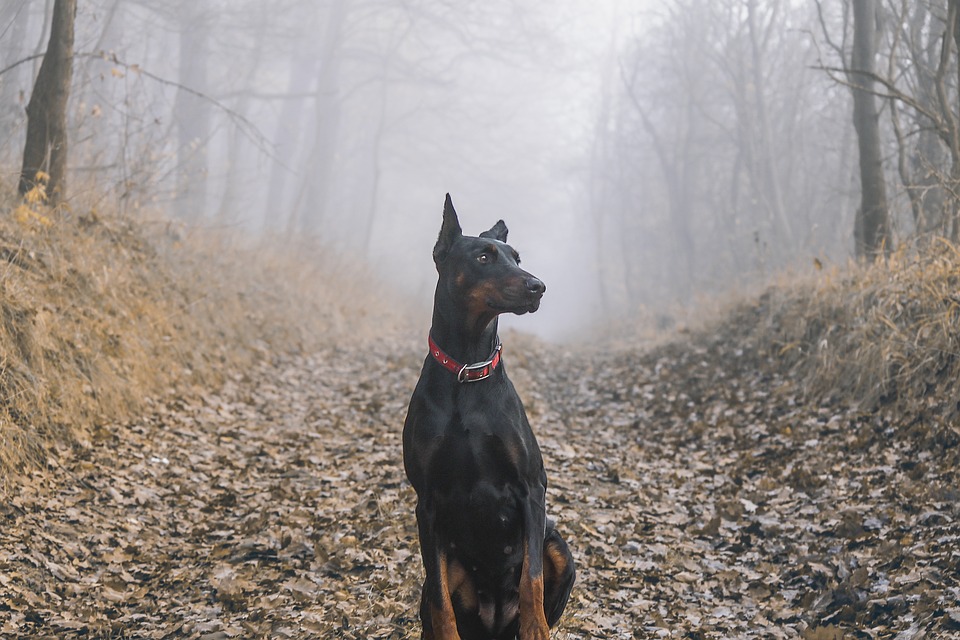
However, contrary to this, this dog is friendly, intelligent and faithful to its owners.
One of the aspects that stand out in its physical structure is its medium size and body, which is square and muscular, while its head is shaped like an elongated wedge. Its average height is between 68 and 72 centimeters with a weight of about 40 kilograms in male specimens.
In the case of females, these tend to be smaller, measuring between 63 and 68 centimeters with an approximate weight of 32 kilograms.
The fur of this breed is short, straight, thick and shiny and its ears are naturally dropped. Previously, owners used to cut them while the dog was still a puppy, but this practice has been reduced since it is considered unnecessary and abusive to the animal.
In particular, this breed can be found in some European countries such as Germany or Spain. Similarly, thanks to the popularity it gained during its participation in World War II, it was able to expand to the Americas, specifically to the United States. In this country, it enjoys great support and it is possible to find him in homes like a guard dog.
Today, there are many farms around the world where you can buy specimens of this breed.
The Doberman is a German-native breed. This interesting fact could give us an idea that they perform more favorably in cold climates. However, this concept is far from reality.
This is because it prefers hot climates. This breed is not cold tolerant, so it is not recommended that they sleep outside the house and if they do, you should build a structure that allows them to sleep warm and free of drafts.
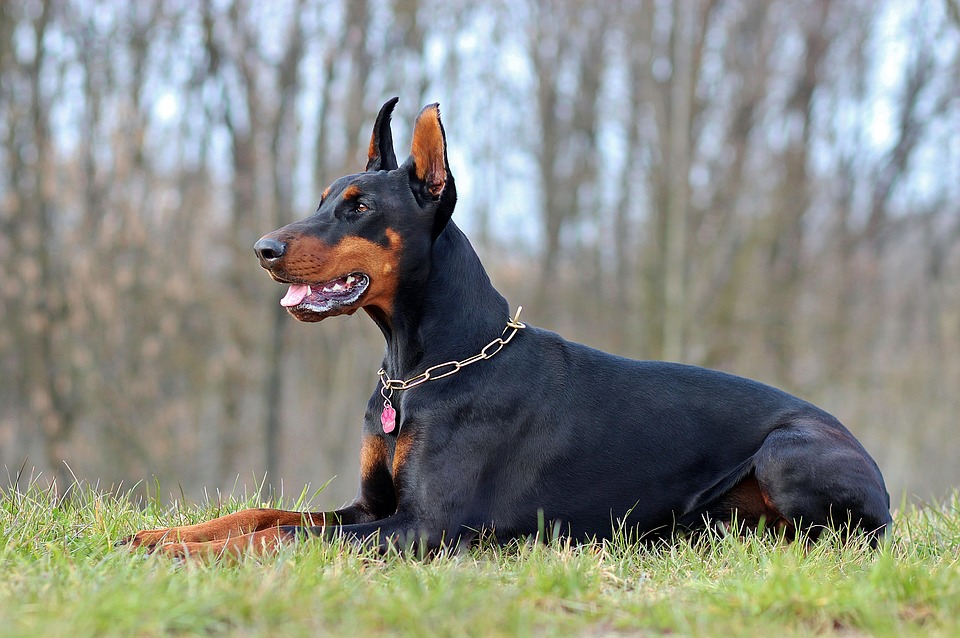
Its physical appearance, that is, its long snout, is what allows it to withstand and cope more easily with heat.
This dog breed is strong and healthy. With an adequate diet and lifestyle, their life expectancy is calculated between 10 and 13 years.
Doberman requires a lot of daily exercise since the lack of physical activity could cause them to become aggressive. They can adapt to living inside a house or an apartment, as long as their master gives them long daily walks where they can spend all their energy. It will always be better to have a yard where the dog can run freely.
Although the Doberman is an extremely healthy breed, in some cases, it can present certain physical problems, so to ensure a calm lifestyle that can live for the average time, and even more, you should take it to regular medical checkups to check its health status.
At present, many negative things are said about this breed of dog, which turns out to be exaggerated when mentioning certain aggressive features. Their instinct, coming from their origin is that of a tough and strong dog. In spite of this, when they are trained correctly, all this is left behind and we can have at home a faithful and obedient pet, which makes it perfect for the whole family.
History and Origin of the Doberman Dog
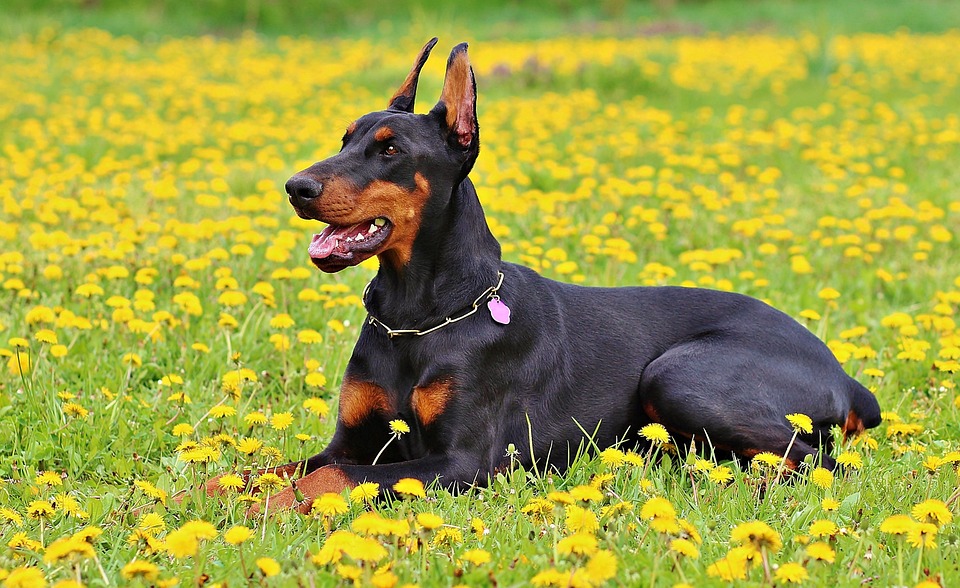
The Doberman is one of the most beautiful and imposing dogs that exist today and has a controversial origin, victim of many incorrect stories about their behavior.
All breeds that we find around the world are based on an uncertain origin due to a lack of information. Undoubtedly, the Doberman does not escape this reality, and it is that uncertainty and concrete data do not go hand in hand with its origins.
Since its development, this enigmatic animal fulfilled two specific functions: controller of some species or vermin and guardian of its masters, the latter thanks to its imposing physical characteristics and protective character. For this reason, it was put as a working dog at the service of people.
The origin of this dog is relatively close to the current era and much clearer than that of other races. During the late nineteenth century, Friedrich Louis Dobermann began a series of experiments involving different breeds to create a guard dog. For sure today they are not known with certainty and accuracy which were those breeds.
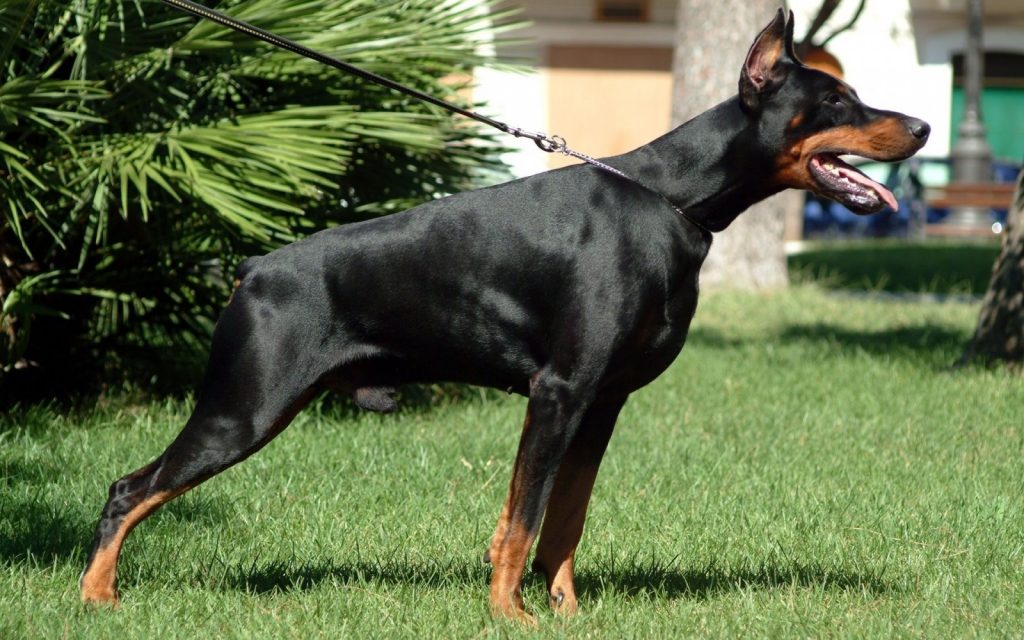
It is emphasized by historians that Friedrich’s goal was to find protection with this experiment. The reason for this search was due to his work as a vigilante and tax collector, reaching unsafe places without any help.
The breed’s development dates back to the town of Apolda in Thuringia, Germany. The first name it was known with was «Dobermann’s Dog» in homage to its creator. Later the term «Pinscher» is added to its name, translated as «terrier»; the reason for this is unknown.
There is no clear information on the breeds initially used for breeding since Friedrich Louis did not leave any details of his experiments in writing before his death. This breed is believed to be a descendant of the union of a Rottweiler, with the German Bulldog, the Thuringian Shepherd, and the German Pinscher.

Another of the crosses of which the Doberman is thought to be born is the combination between the German Braco, the Greyhound, and the Manchester Terrier. From all of them, he was able to obtain the best qualities to be an animal of increasing popularity and important functions.
Physically the first specimens were muscular and resistant, with a thick and heavy skull.
The development of the breed did not end with the death of its creator, Friedrich Louis Dobermann. A large number of breeders continued his legacy by perfecting and improving new specimens, including Otto Goeller, Gustav Krumbholz, among others.
The first Doberman
Although there is no clear evidence that accurately defines the origin of the breed, it is possible to know which was the first specimen created. Thanks to Robert, son of Friedrich, it was learned that the first offspring was called «Bisart», a female obtained thanks to the crossing of Wattenrock a dog with a Pinscher background and a pure Pinscher male whose name is not reported.
It is clear that the origins of the breed are not accurate and lack information, but they do establish that to achieve the current Doberman, it was necessary to cross several dogs.
This is also consistent with the fact that its creator had access to a huge variety of dogs for one of his works as an official captor. As such he had access to all who were strays.
Migration to North America
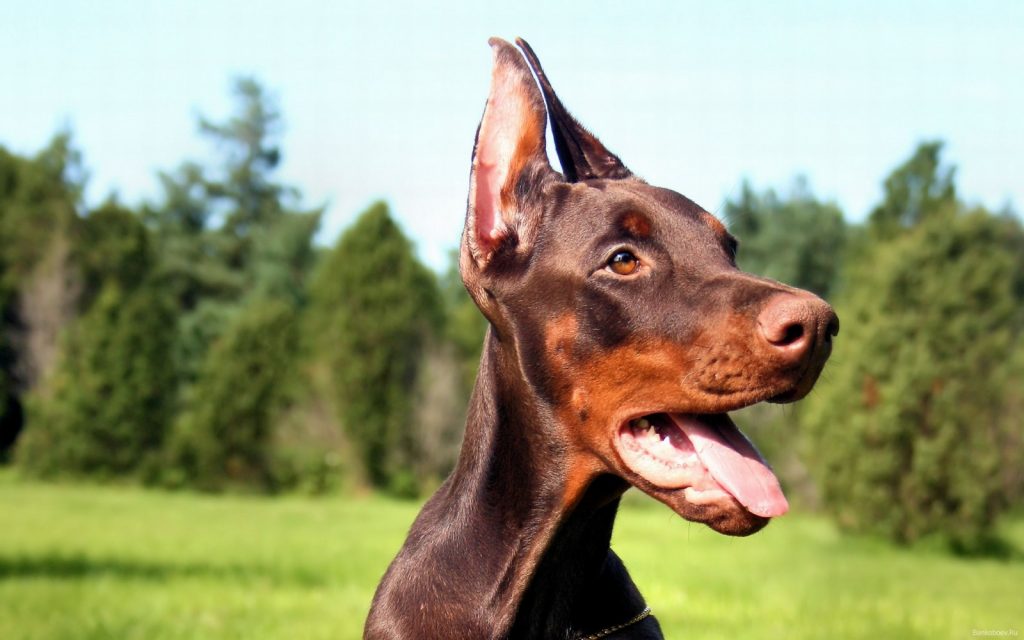
The arrival of the Doberman in the United States is given by the year 1898 under the responsibility of E.R. Salman. In the books of the American Kennel Club, it was established that the first specimen known in this part of America was named Intelectus, registered with the canine institution in 1908. Intelectus’ parents were Bertel and Hertha, of German origin.
The first male champion of an official dog competition was Dix, with the peculiarity of being the first to be raised in the United States. Thanks to the growing interest among the inhabitants and breeders for this breed, the Pinscher Club of America was created for the year 1921, focused mainly on all its specimens.
The Doberman today
The rise of the popularity of the Doberman in the canine exhibitions began during the decade of the 50s. Broad participation in different categories started a time of glory for the race.
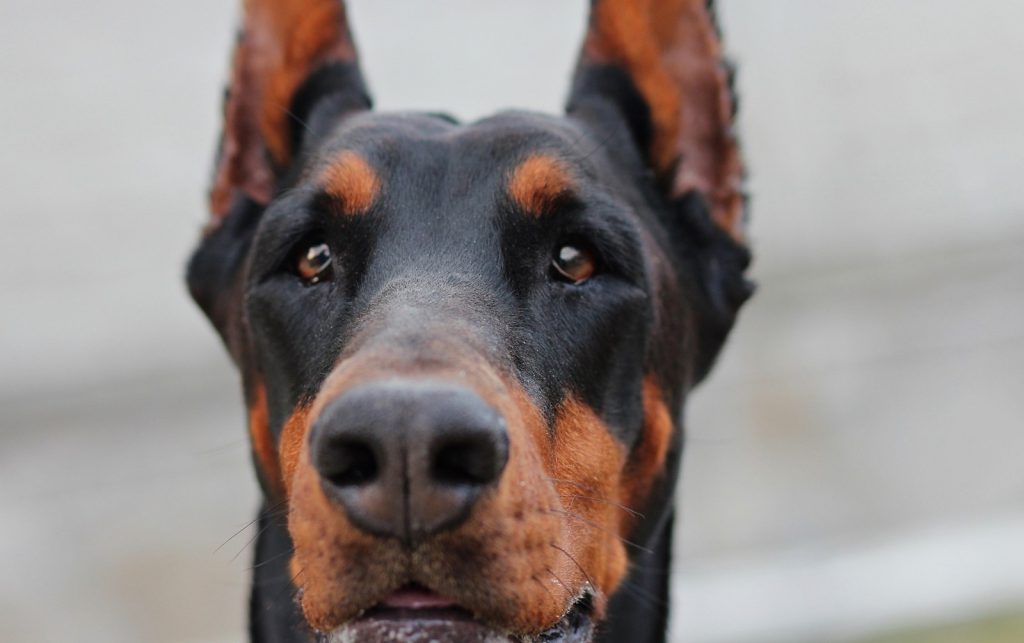
The history of this incredible animal is full of particularities in each of the crosses that were necessary to reach the final result by the end of the 19th century. However, with determination and many efforts, all trained breeders managed to manipulate the genetics in search of the ideal characteristics.
Despite being a very recent breed, its evolution has been successful quickly generating great expectations. Undoubtedly the origin of this dog is based on the struggle and love of its owners to create the desired pet.
Characteristics of the breed
The Doberman is a strong dog, and they are a very popular breed; its image is wrongly related to attacks, aggressiveness, but also the police and rescue training. This breed is included in the group considered as potentially dangerous dogs, identified by its acronym PDD.
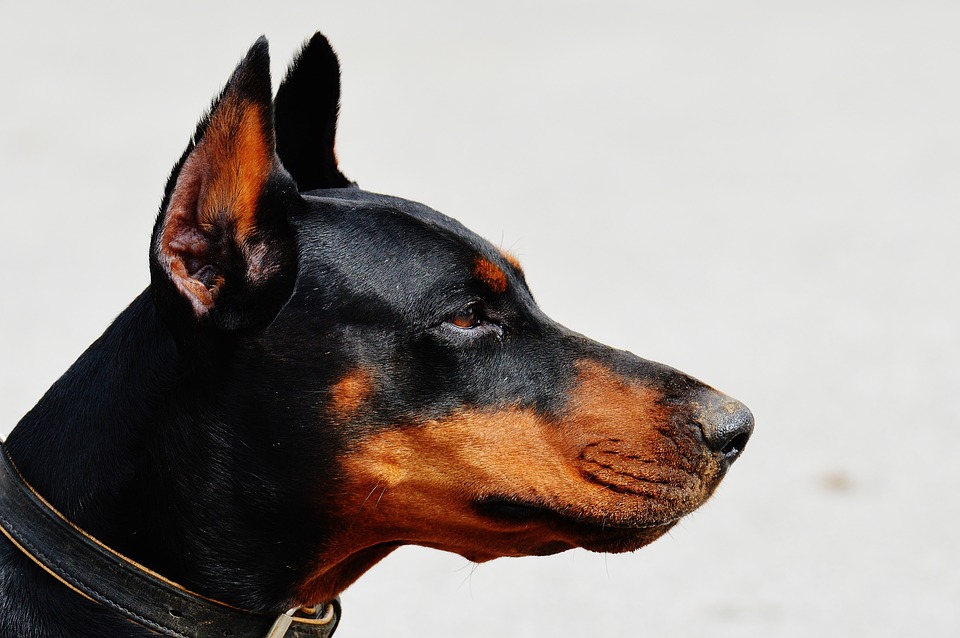
Despite this, its appearance is stylized, beautiful and striking. The Doberman is a medium-sized dog that exhibits a strong and muscular body, with great abilities and body skills since it can move with great agility and speed, whether it is a small or large space, the Doberman has many physical qualities for training.
Its size can be measured by the height at the cross, which is about 60 to 70 cm, with a weight that ranges between 30 and 40 kg, these dimensions being slightly larger in males than in females. Body lines are well defined, which gives the dogs a muscular appearance and a very athletic figure.
The tail is thin and elongated of medium implantation, although it is usually trimmed so that it is amputated. This conformation of the body gives it a very elegant appearance, with an imposing march and long steps.
The cephalic region of the Doberman is elongated, though, its head looks slender with an Egyptian profile. The eyes are dark, oval and medium-sized, the snout is elongated and the nose or nose is dark. A peculiarity that describes and many times even identifies this race is the shape of the ears.
Naturally, the Doberman has droopy ears, however, there are some countries where it is allowed to trim them, leaving them so that they are erect, triangular and pointed. This cut of the ears has several styles, which will be made according to the functions of the dog, and a specialized veterinarian must carry out this procedure. The ears are cut after 8 weeks of life and before 10 weeks. Although, practices like this are increasingly banned by animal protection societies. When the ears are not cut, they give a larger and rounded appearance to the head, these are arranged on each side, fall and are quite large.
The Doberman’s neck is arched and elongated. Wide chest and straight loin all the body lines of this breed of dog are straight, which makes its appearance very stylized.
Concerning the fur, this is characterized by being short-haired, which can be presented in black, dark brown, brown or dark red, and also bluish-black. The hair will be presented arranged in a single layer, smooth, shiny and short, which is very attached to the body. The texture gives this type of fur a rough feeling.
With these characteristics and appearance, the Doberman looks like an imposing, strong, muscular and stylized dog, a canine specimen worthy of admiration.
Behavior with other dogs
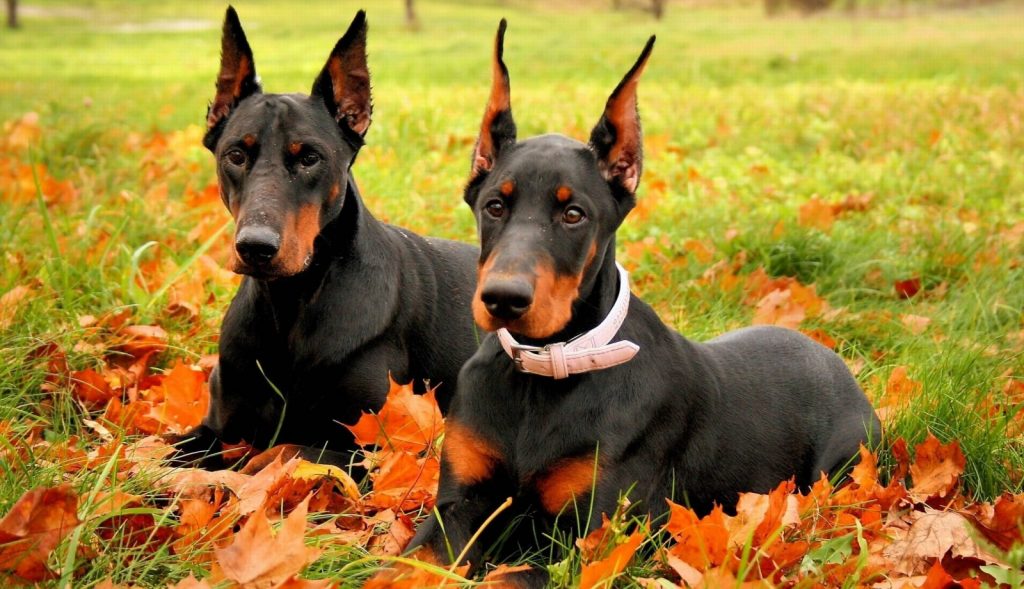
For many years, and erroneously, the Doberman was associated with the conception that this was a dangerous canine specimen since in many films and advertisements the Doberman appeared in the middle of bites, attacks, much aggressiveness, and even murders. Indeed, this breed is included in the list of dog breeds considered as potentially dangerous.
Although opinions are variable and particular, they differ. Today, many breeders have shown that Dobermans are, most of the time, very easy to train dogs; they are loyal and have a sense of commitment and protection towards their owners that is incomparable. However, they can indeed be dominant and temperamental, especially with strangers.
The Doberman is a clever dog; it is intelligent and imposing, its character reveals that it has a dominant attitude and is born a leader. That character, however, must be regulated and controlled with positive training that starts from an early age and that fundamentally includes socialization, not only with other people, also with the companions of the same species the dogs.
The Doberman can react with rejection and intolerance towards other dogs since it is usually haughty, dominant and very determined, does not like to feel competition or that someone invades its territory. However, these behaviors can be modulated with socialization training early. Dobermans can live with others of their same breed, with whom they are receptive most of the time, even more so if they grow up together. The matter is complicated a bit when they cohabit with other breeds of dogs.
Dogs with haughty spirit and dominant attitude are not a good company for the Doberman, because the clash of personalities could generate conflicts. However, you can train them, and if both dogs grow together, the risks of aggression and conflict are reduced.
Concerning tolerance with other pets, generally, the Doberman, because of its strong and imposing character, is not very tolerant to live with domestic pets such as cats or rodents, however, it can withstand it, although it is preferably not recommended to avoid problems of intolerance between animals. It is important to say that during training, an effective, complete socialization can be the key tool to improve the process of living with the environment and other pets.
On the other hand, it is recognized that the Dobermans are not terrible and dangerous dogs that have often been shown to us. It is a strong, energetic dog, that, well trained, is an exemplary animal. Its haughty and airy attitude always prevails. A technique to have your mood controlled at home and keep them busy on something, as well as dedicate at least 3 hours per week for outdoor fun, in this way, will release your energy and control the impulses of aggression, anger, and destruction.
Diet and feeding
The feeding of a dog is a key point in the care of all pets because, through it, the dog can acquire the necessary nutrients that will lead him to enjoy an exemplary life, growing healthy, strong and reaching its maximum possible life expectancy.

It is prudent to find out about the best feeding options for our Doberman dog. Commonly, the most recommended and universally accepted is the variety of dry food for industrial processing.
This product is the most recommended due to the ease with which it can be purchased since it is not very expensive, it is made with a combination of nutrients and also comes in various presentations according to the age of the dog, whether it is a puppy (junior), or an adult (senior), or even for small and large breeds.
In the particular case of dogs of the Doberman breed, these begin to feed on dry food more or less after 4 weeks of life, taking the forecast that the feed grains should be softened with water or milk to facilitate their chewing and swallowing.
The best quality product available should be guaranteed, preferably containing meat, chicken, lamb, since these meats are of animal origin and are rich in proteins of high nutritional value. When the Doberman is growing, from more or less than 4 months, it is in the stage of growth and development of greater value in the puppy age, therefore, the Doberman must be fed more frequently, so they feedings should be distributed in 3 or 4 portions during the day.
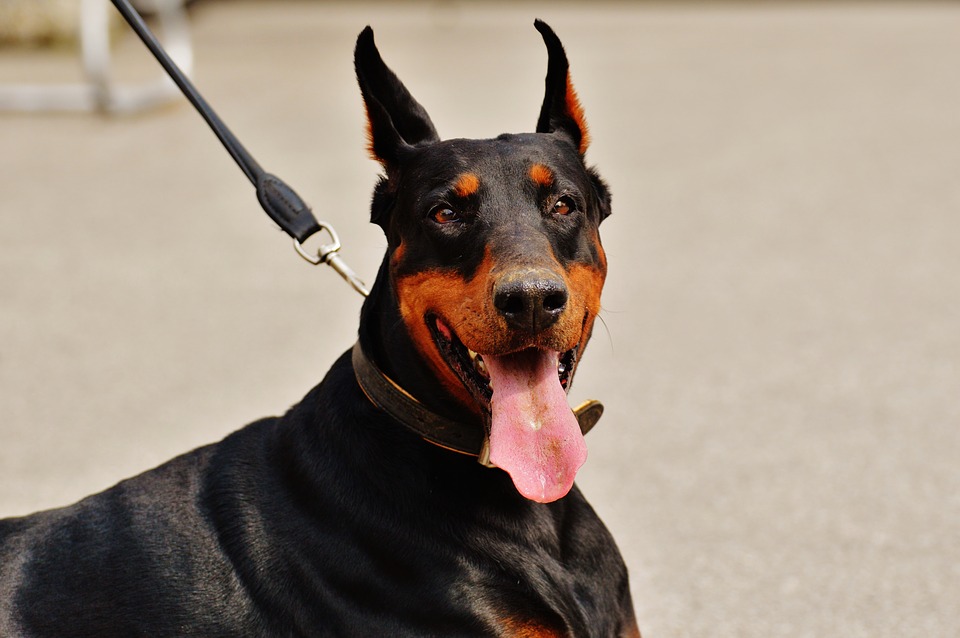
Later, when the dog turns one year old, it is time to change the diet slightly. From this age, we are talking about an adult dog. For this reason, dry feed type foods should be offered for adult or older breeds of one year. During the day, the Doberman can be offered two and up to three special meals, although the idea is to distribute two rations containing about 500 to 650 grams of dry whole food in two doses. Of these grams, two thirds will be meats and one third will be vegetables, daily.
Other alternatives for food, such as wet feed, can be taken sporadically. Also, there are some raw bones that dogs like to bite, however, the denture of the Doberman is somewhat delicate, it could suffer mouth injuries such as fractures of the teeth, injuries in the tongue, among other disorders that can even come to affect lower segments of the digestive system.
An important point to consider is that the Doberman’s diet may undergo slight modifications concerning the activities and personality of your dog, if it is an energetic, fun, very active dog, you will probably need larger portions or an extra portion of food.
Finally, remember the water. Offer your Doberman a bowl of cold water that is clean so that it stays well hydrated.
Health and general care
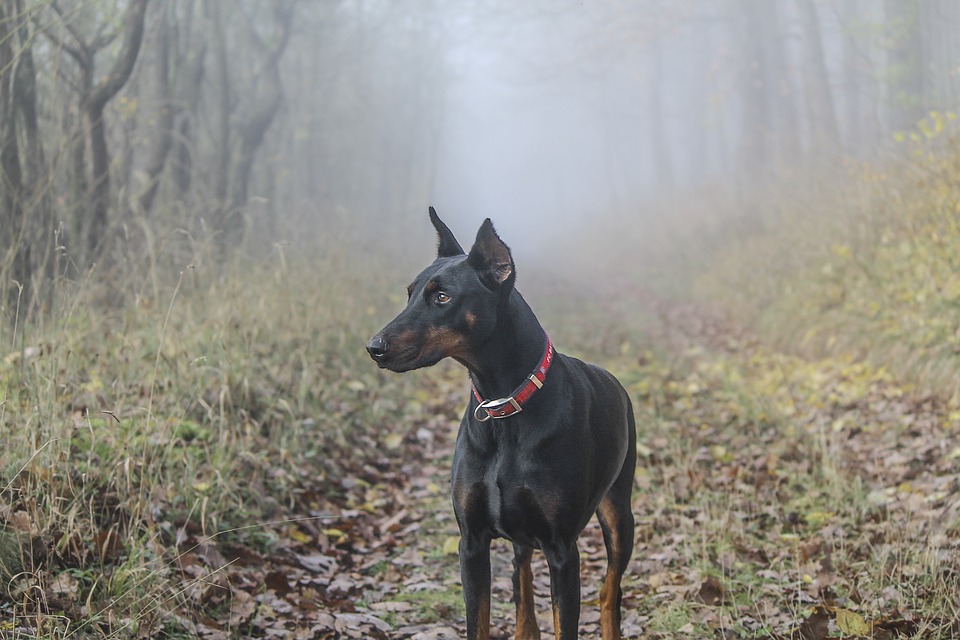
Caring for a Doberman requires a loving and patient owner, who at the same time has a firm and dominant character to assume the role of the leader in front of the dog. Of course, the owner must take into consideration certain basic aspects that have to take care of dogs of this breed so that they grow strong and healthy; likewise, it is recommended that the owner is not an inexperienced at all and has some experience in animal care. The aspects to consider about the care of the Doberman are mainly, the cleanliness, health, training, besides the feeding.
The Doberman is a very athletic, strong, energetic and fun breed, overflows a lot of activity and enjoys playing, running and playing games. These animals need enough time to let out all that energy they contain, so it is recommended that you take some time a week to take your dog to an open and safe place where they can jump, run, play and train. Dobermans love to run, so the ideal thing would be for the site to have a high fence to prevent the dog from escaping towards the road where accidents can occur. Another appropriate game for this dog is to jump and chase objects like disks. Similarly, the Doberman needs daily walks to do his physiological needs and stay stimulated.
About the care of its hygiene and its cleanliness, the Doberman has the advantage of having a dark and short fur that will get a little dirty. It requires gentle brushing, daily or three times a week with a soft bristle brush to take care of its fur, keep it clean, with dead hairs removed. Bathing will be a sporadic activity, once every three months. It is also recommended to clean the eyes and ears with sterile solution dressings about once a week and, frequently check their paws, since, being very active dogs that like to run, the legs could accumulate spikes, dirt, and other things.
Although it is a fairly strong breed of dogs, unfortunately, this dog is not disease-free. Several pathologies can affect a Doberman. Among them we can mention:
- Skin diseases such as allergies and infections, caused by fungi, parasites and other infections or allergies.
- Cardiac pathologies such as dilated cardiomyopathy that ultimately leads to heart failure.
- Endocrine problems such as hypothyroidism.
- Osteoarticular diseases such as herniated discs and spinal defects.
- The blue Doberman syndrome, which is a disease of both puppies and adults and which causes the skin to become scaly.
Also, take your Doberman regularly to the veterinarian to verify their development and health status, in addition to keeping their vaccinations and deworming up to date. With good care, the Doberman reaches a life expectancy of up to 10 to 12 years in most cases.
How to train and educate a Doberman dog

The Doberman is a breed of dogs that are recognized for having a strong and very dominant character, are leaders par excellence and have a strong territorial sense. Although, in turn, this breed has the advantage of being very intelligent dogs, which allows the Doberman to easily learn the behaviors to follow during training. However, it is not a breed of dogs that is recommended for the inexperienced.
In general, Dobermans are recognized for being attentive, affectionate and sweet dogs with people, especially with their family, but we must remember that these qualities are refined and guaranteed in the Doberman’s personality thanks to the training that exploits and refines what it is the socialization of these dogs, especially when they are puppies.
Dobermans need careful socialization and dedicated training that focuses on obedience and the practice of tolerance and receptivity towards other people, particularly children and of course, also training for behavior with other pets.
When it comes to training a Doberman dog, some aspects have to be taken into account. In the first place, the Doberman can be a very noble and friendly dog; it is an excellent guardian dog, faithful and protective, however, it is closely linked to its instincts and has basic needs of attention, such as food and exercise, that ought to be satisfied to maintain a good character.
For example, if the Doberman remains at home alone for a long time, or if his owner is not given to activities that stimulate him and allow him to drain his energy, this dog can become irritable, aggressive and violent. It is necessary to focus on attending to it and fulfilling its needs so that the training is easier.
Doberman’s education should begin at an early age, between three and four months. It should be sought to live with all family members, especially with children, and also with other pets that are safe for both.
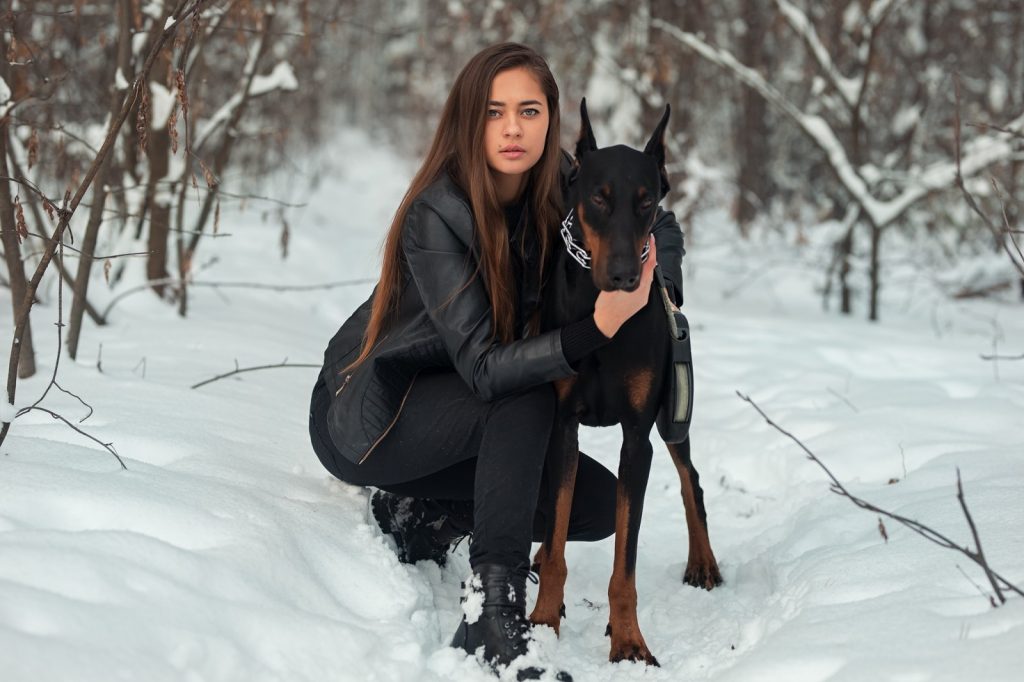
You can take it for a walk in the park frequently. The idea is for it to observe people and pets around it too and start accepting them. A piece of important advice, especially to control the impulses of this dominant dog, is that at the time of the walks, you, the owner and coach, must go one step ahead, the Doberman must walk by your side and not dragging or pulling from the rope. This will make it understand that you are their leader.
Dobermans are intelligent, affectionate and attentive dogs. When they have been trained properly they are affectionate and sweet with family and close people.
The great intelligence of these dogs makes them wonderful candidates for learning basic orders and tricks, it has even been said that they can reason. In basic training it is simple and is driven when techniques such as positive reinforcement or clicker technique are incorporated, this stimulates and disposes of the dog more to collaborate with their education.
The main commands will be the following: «No» when no action or conduct is desired, it is repeated and maintained in a firm and clear voice, «Come here» to call it, «sitting», «lying», etc.
Physical punishments are inadvisable. It is simply about educating and raising the dog with firmness, affection, regulating and controlling its impulses. If you need help with training, you can always look for an expert.
Behavior with humans
Knowing the Doberman breed in depth we can realize that all the things said about their bad reputation and aggressive and even lethal behavior are nothing more than exaggerations and ill-intentioned speculations.
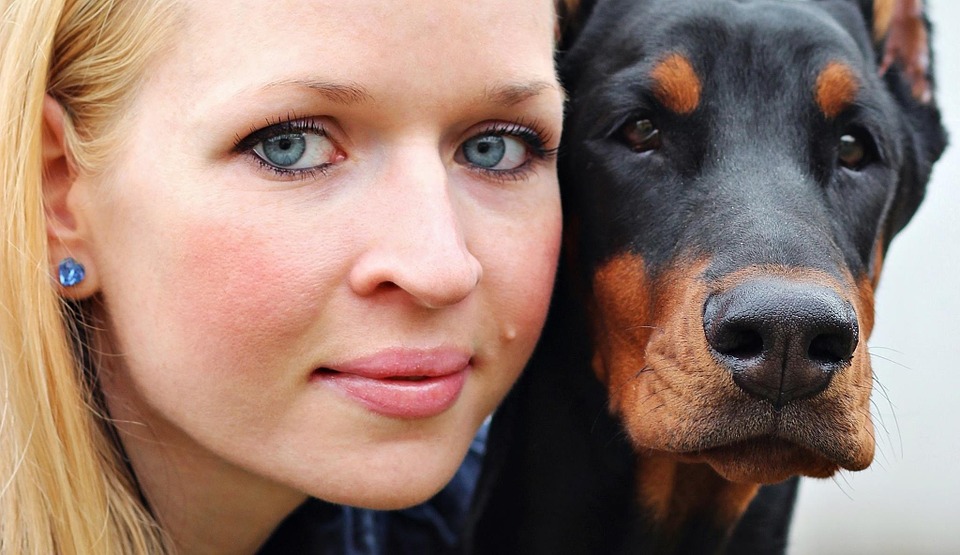
The Doberman is a dog with a strong and imposing personality, it is certainly so, however, it has qualities as tender and noble as attachment, affection, fidelity, which with optimal training can emerge as the best aspects of the personality of this dog.
The Doberman dog is a specimen that has many virtues. We observe in it an active, intelligent puppy with a lot of personality and attitude. Its bearing indicates confidence, self-confidence, and elegance. This dog has a strong territorial sense, is alert to threats, strangers, intruders in your home, it is very protective and is considered to be one of the best guard dogs that can be achieved.
In addition to these strong characteristics, we are also faced with a dog that has deep-rooted senses of leadership and dominance, with a strong character that seeks to impose. This is likely the effect that should focus more on controlling the aspect of education and tolerance of this dog, to be able to appease his instincts as an “indomitable” leader and boss.
On the other hand, the Doberman has many other qualities that are worth highlighting. The puppy behind its rough and cold appearance hides a noble heart. It is a pet that comes to develop a bond of union with its owners very special, can become fond of everyone, and sometimes more with a particular family member. They are protective, loyal, faithful and very friendly with those they love.
Usually, with children it has no problems, although it is not a dog that easily tolerates the noises and games of children that can be somewhat tough, so it is strongly advised not to leave them alone playing; if you have children, choose a more patient breed.
It is a versatile and energetic dog, it is also very social, does not like to be isolated, locked up or alone, prefers the company and play with his family.
For being an attentive, alert, intelligent and observant dog, the Doberman is considered one of the best breeds of guard dogs, they have a strong sense of belonging to their home and is very close to their family, defends them, protects them and is alert to take care of possible threats.
In another sense, these skills of intelligence, alertness, protection, and care in the Doberman, added to its excellent sense of sight and great smell, have been used by people to train it in police activities, and even to war, being part of many security forces. And in addition to this, the Doberman has many physical abilities and skills to move quickly, quickly and confidently, which has enabled him to be a participant in many dog sports competitions and skill tests.
Ideal environment
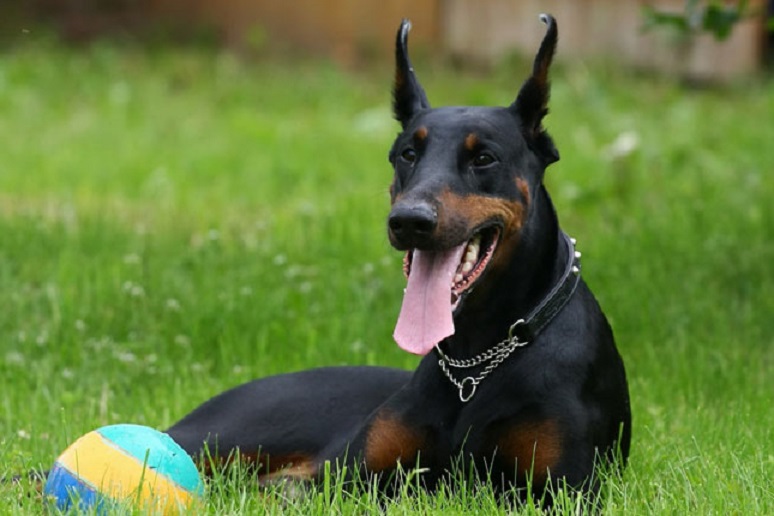
The Doberman dog is a member of one of the most appreciated and valued dog breeds, not only for its physical, imposing, slender, elegant gait and fine and marked features but also for the fortunate qualities of his personality that make it a friendly, social, affectionate, attached, energetic, playful dog, with dominant and overt protective attitudes.
A dog of this breed requires a complex social and emotional environment that allows its owner to control the not so favorable qualities, and exploit the wonderful attitudes of this pet.
First of all, focusing on the environmental aspect, the Doberman is a medium to a large-sized dog that needs some physical space to feel comfortable and move easily, although this does not mean that it cannot live in an apartment the Doberman is very agile to slip between small spaces with its thin and delicate legs. The only the observation made is that, if the Doberman lives in an apartment, the owner must commit to taking it out for a walk every day at least twice to fulfill its needs and to exercise a little with a quick walk and, also, the Owner has to ensure for the Doberman frequent and regular exercise routines that can be carried out when visiting the park, for example.
If the home is a house with outdoor spaces, such as gardens, these needs decrease, since the Doberman will easily have access to these areas where he can run and release energy, although it is always advisable to share quality time with its owner, to live more, socialize more and adapt to the treatment of people. On the other hand, this coexistence with his family allows him to develop bonds of attachment, protection, and care.
A Doberman is a dog that needs attention and affection regularly. It needs a family that has enough time to spend with it, train and educate it. It is not advisable to leave it for a long time alone at home, or to be part of poorly active families, a dog of this breed that remains alone for a long time can become aggressive, destructive and develop stress and anxiety. The emotional development of the Doberman to bring out the best qualities of his personality depends very much on the treatment the family gives and the time they spend together. So, the Doberman is not a pet for less active families, or for houses where there are small children since these dogs are not too patient.
Considering the climate and environment of the Doberman is another point for the care of this breed. These dogs have a layer of short hair attached to the body, which does not offer enough protection against cold and rainy climates, so in the winter it is recommended that you keep your dog protected inside the home and reduce the duration of their daily walks since they are sensitive to these low temperatures.
Knowing these generalities, you can analyze and decide if you have the necessary environment for this great breed of dogs, Doberman, and if this is the right pet for you.
